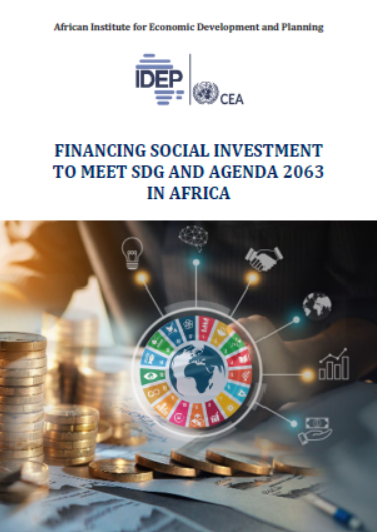Online course: Financing Social Investment to Meet SDG and Agenda 2063 in Africa
PROGRAM RATIONALE
Three criteria for classifying public investment, namely, administrative, economic and functional, are identified in the Government Finance Statistics Manual (International Monetary Fund, 2014). The criteria complement one other and capture investment from various dimensions with distinct analytical applications. In so doing, the spending targets in education, health and social protection will be useful in assessing the translation of political intent to resources, allowing for comparability in countries, and most importantly, assessing the relevance of spending targets in achieving the intended objectives.
Social investment refers to the economic effort made on the social development of individuals, households and communities (Cecchini and others, 2015). The use of the term “investment” is applied because the resources allocated to social issues (i.e., education, health and social protection) yield economic and social returns. Social investment consists of public or private resources that are used mainly to ensure a supply of adequate food, health care, education, housing, water and sewerage systems, or to finance demand for these, and provide monetary insurance against loss of income or assets that would risk living standards falling below an acceptable level (Martinez and Collinao, 2010).
Thus, social investment involves strengthening people’s current and future capacities. In other words, as well have having immediate effects, it also have lasting impacts by offering economic and social returns over time, notably in terms of employment prospects or labour incomes. Social investment helps to 'prepare' people to confront life's risks, rather than simply 'repairing' the consequences. Modernisation of social policies requires systematic introduction of ex-ante result orientation in financing decisions and a systematic approach of the role social policies play in the different stages in life: from education via work/unemployment to sickness and old age.
There is a level of difficulty in analysing social investment, between executing the resources and who finances them. Records of social investment-related transactions tend to track only the executing entity. Systems of national accounts should, in theory, provide a clear source for that component, but Africa lacks mandatory or standardized systems with regular detailed information of source in this area. In Africa, another complication is the mix between private and public social investment in education, health and social protection. Private expenditure by households on health is approximately 50 per cent of total expenditure, and therefore public spending does not capture total health spending. Nevertheless, public social spending data that are available allow for the quantifying of specific outlays by the State, whatever their financing source, by following the procedures set out in the Government Finance Statistics Manual. In Africa, public social spending figures, in general including education, health, social welfare, water and sanitation, employment and housing, are important in demonstrating prioritization in the budgets on social areas (Harrington and others, 2007).
High levels of public debt, pressure on government expenditures, and existing financial regulations are some of the existing barriers to increasing the level of social investment in Africa. However, to meet the SDGs and the Agenda 2063goals, increased efforts in deploying social investment strategies are needed now more than ever. Such strategies imply investing in people’s capabilities and social infrastructures, but also in social innovation and the delivery process of public goods and social outcomes. This is crucial to address current market failures in the social sector and to ensure that existing investment can prompt greater levels of social cohesion and territorial convergence.
Furthermore, the challenges for mobilising financial resources for sustainable development are huge; according to Schmidt-Traub, G. (2015), an estimated $600 billion and $638 billion are needed per year to achieve the SDGs in Africa. Official development assistance (ODA) remains essential but alone will not be enough to meet the SDG financing gap. Delivering resources at the scale required to achieve the SDGs requires action from a wide range of actors working together. Private finance will play an increasingly important role in bringing additional resources to help developing countries achieve the SDGs. It is therefore important to find new ways of engaging with the private sector as a key partner, including through financing social investment. The Addis Ababa Action Agenda (AAAA) mentions financing social investment to achieve the SDGs.
Against the above background, the ECA Gender, Poverty and Social Policy Division (GPSPD Division and the African Institution for Economic Development and Planning (IDEP) are collaboration to launch an on-line course on “Financing Social Investment for Achieving SDGs and Agenda 2063”.
LEARNING OBJECTIVES
The course will introduce the fundamentals of social investment and developing a business strategy that drives financing social investment. Learners will enhance their knowledge and skill on social protection and social services the state of key social services in Africa, Social Investment in the context of SDGs and Agenda 2063, monitoring social investment in Africa and financing social investment in Africa: policy and strategy.
At the end of the course, participants will have:
- An enhanced understanding of the key concepts, trends and conditions of social investment in Africa
- An improved understanding of the state of social protection and social services in Africa
- An enhanced skill on social investment ecosystem and products
- The knowledge and skills to monitor and benchmark social investment status at national level
- An improved knowledge on the challenges and opportunities of financing social investment in Africa and related policy intervention to ensure the financing of social investment to meet SDGs and Agenda 2063.
